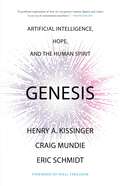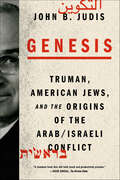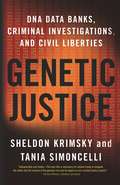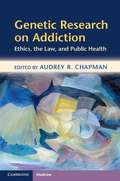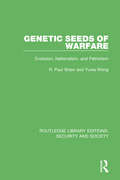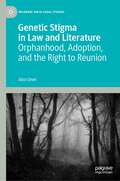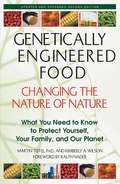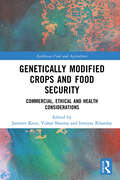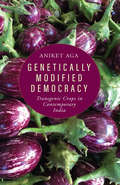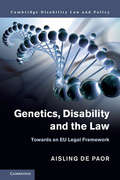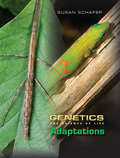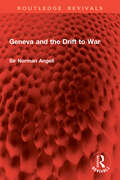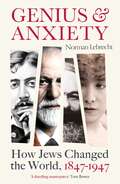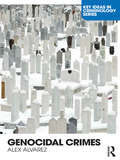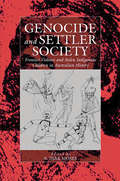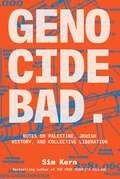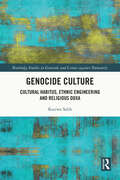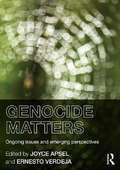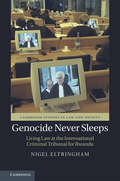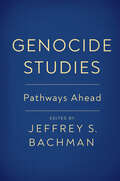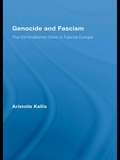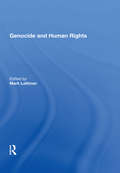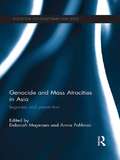- Table View
- List View
Genesis: Artificial Intelligence, Hope, and the Human Spirit
by Henry A. Kissinger Eric Schmidt Craig MundieIn his final book, the late Henry Kissinger joins forces with two leading technologists to mount &“a profound exploration&” (Walter Isaacson) of the epochal challenges and opportunities presented by the revolution in Artificial Intelligence: a breakthrough that dramatically empowers people in all walks of life while also raising urgent questions about the future of humanity. As it absorbs data, gains agency, and intermediates between humans and reality, AI (Artificial Intelligence) will help us to address enormous crises, from climate change to geopolitical conflicts to income inequality. It might well solve some of the greatest mysteries of our universe and elevate the human spirit to unimaginable heights. But it will also pose challenges on a scale and of an intensity that we have never seen—usurping our power of independent judgment and action, testing our relationship with the divine, and perhaps even spurring a new phase in human evolution. The last book of elder statesman Henry Kissinger, written with technologists Craig Mundie and Eric Schmidt, Genesis charts a course between blind faith and unjustified fear as it outlines an effective strategy for navigating the age of AI.
Genesis: Truman, American Jews, and the Origins of the Arab/Israeli Conflict
by John B. JudisA probing look at one of the most incendiary subjects of our time—the relationship between the United States and IsraelThere has been more than half a century of raging conflict between Jews and Arabs—a violent, costly struggle that has had catastrophic repercussions in a critical region of the world. In Genesis, John B. Judis argues that, while Israelis and Palestinians must shoulder much of the blame, the United States has been the principal power outside the region since the end of World War II and as such must account for its repeated failed diplomacy efforts to resolve this enduring strife.The fatal flaw in American policy, Judis shows, can be traced back to the Truman years. What happened between 1945 and 1949 sealed the fate of the Middle East for the remainder of the century. As a result, understanding that period holds the key to explaining almost everything that follows—right down to George W. Bush's unsuccessful and ill-conceived effort to win peace through holding elections among the Palestinians, and Barack Obama's failed attempt to bring both parties to the negotiating table. A provocative narrative history animated by a strong analytical and moral perspective, and peopled by colorful and outsized personalities and politics, Genesis offers a fresh look at these critical postwar years, arguing that if we can understand how this stalemate originated, we will be better positioned to help end it.
Genetic Justice: DNA Data Banks, Criminal Investigations, and Civil Liberties
by Sheldon Krimsky Tania SimoncelliNational DNA databanks were initially established to catalogue the identities of violent criminals and sex offenders. However, since the mid-1990s, forensic DNA databanks have in some cases expanded to include people merely arrested, regardless of whether they've been charged or convicted of a crime. The public is largely unaware of these changes and the advances that biotechnology and forensic DNA science have made possible. Yet many citizens are beginning to realize that the unfettered collection of DNA profiles might compromise our basic freedoms and rights.Two leading authors on medical ethics, science policy, and civil liberties take a hard look at how the United States has balanced the use of DNA technology, particularly the use of DNA databanks in criminal justice, with the privacy rights of its citizenry. Krimsky and Simoncelli analyze the constitutional, ethical, and sociopolitical implications of expanded DNA collection in the United States and compare these findings to trends in the United Kingdom, Japan, Australia, Germany, and Italy. They explore many controversial topics, including the legal precedent for taking DNA from juveniles, the search for possible family members of suspects in DNA databases, the launch of "DNA dragnets" among local populations, and the warrantless acquisition by police of so-called abandoned DNA in the search for suspects. Most intriguing, Krimsky and Simoncelli explode the myth that DNA profiling is infallible, which has profound implications for criminal justice.
Genetic Research on Addiction
by Audrey R. ChapmanThe manner in which genetic research associated with addiction is conducted, interpreted and translated into clinical practice and policy initiatives raises important social, ethical and legal issues. Genetic Research on Addiction fulfils two key aims; the first is to identify the ethical issues and requirements arising when carrying out genetically-based addiction research, and the second is to explore the ethical, legal and public policy implications of interpreting, translating and applying this research. The book describes research guidelines on human protection issues such as improving the informed consent process, protecting privacy, responsibilities to minors and determining whether to accept industry funding. The broader public health policy implications of the research are explored and guidelines offered for developing effective social interventions. Highly relevant for clinicians, researchers, academics and policy-makers in the fields of addiction, mental health and public policy.
Genetic Seeds of Warfare: Evolution, Nationalism, and Patriotism (Routledge Library Editions: Security and Society)
by R. Paul Shaw Yuwa WongFor millennia humanity has simultaneously deplored and waged war. With each conflict the stakes have risen, and we now face global annihilation for the sake of a practice all the world claims to condemn. Is there some seemingly irresistible force that impels us toward our own destruction? To explain this central paradox of human behaviour, Genetic Seeds of Warfare, originally published in 1989, advances a startling new theory. It traces the origins of warfare back to early groups of Homo sapiens in competition for scarce resources, showing that warfare evolved as these groups evolved: kin-group against kin-group; tribe against tribe; nation against nation. Rather than being tied to a specific gene, warfare emerged as one of many behavioural strategies for maximising genetic survival. As social groups became more complex, motivations for warfare developed from simple protection of blood relations to political appeals to shared ethnicity, religion, and national identity. But the ultimate cause of warfare is rooted in the most basic of human drives: the need to ensure that one’s genes will survive and reproduce. The authors challenge many assumptions about human behaviour in general, and warfare in particular. They convincingly present the case for an evolutionary understanding of the propensity for warfare, supporting their argument with data from a vast array of social and natural science research. In doing so, they reveal why previous attempts at ending war have failed, and make proactive suggestions toward the development of a new agenda for world peace.
Genetic Stigma in Law and Literature: Orphanhood, Adoption, and the Right to Reunion (Palgrave Socio-Legal Studies)
by Alice DiverThis book critically analyses the way in which traditional sociocultural and legal biases might be perpetuated against those with unknown – or unknowable – genetic ancestries. It looks to law and works of literature across differing eras and genres focussing upon such concepts as inherited stigma, illegitimacy, orphanisation, adoption, othering, reunion, and the ‘right’ to access truths that relate to one’s original identity. Law’s role in such matters is often limited (or usurped) by custom, practice, or lingering superstitious beliefs; the importance of oral and written testimony is therefore highlighted. Characters include abandoned or orphaned figures from folk and fairy tales, Romantic and Victorian monsters and heroes, Dickensian waifs, Edwardian rescue orphans, and dystopia-set ‘rebels.‘ Their insights and experiences are mirrored in various present day scenarios that speak to familial human rights abuses, not least forced adoptions and bars on accessing original information. This cross-disciplinary book drawing on Law, Literature, Sociology, Critical Adoption Studies should be of interest to those interested in and those who have been affected in some way by adoption, origin deprivation, or reunion.
Genetically Engineered Food: What You Need to Know to Protect Yourself, Your Family, and Our Planet
by Ralph Nader Martin Teitel Kimberly A. Wilson• The book that takes a comprehensive look at the threat to our food supply from genetic engineering. • 15,000 copies sold in the first six months. • Includes new studies about the dangers of genetically engineered food. • Refutes the "feed the poor" propaganda spread by agribusinesses. • Is both an expose and educational primer on this controversial technology that is already a part of every American's diet. • Explains the dangers of these foods to ourselves and our environment in easily understood terms. Picture a world?• Where the french fries you eat are registered as a pesticide, not a food. • Where vegetarians unwittingly consume fish genes in their tomatoes. • Where corn plants kill monarch butterflies. • Where soy plants thrive on doses of herbicide that kill every other plant in sight. • Where multinational corporations own the life forms that farmers grow and legally control the farmers' actions. That world existsThese things are all happening, and they are happening to you. Genetically engineered foods--plants whose genetic structures are altered by scientists in ways that could never occur in nature--are already present in many of the products you buy in supermarkets, unlabeled, unwanted, and largely untested. The threat of these organisms to human and environmental health has caused them to be virtually banned in Europe, yet the U.S. government, working hand-in-hand with a few biotech corporations, has actively encouraged their use while discouraging labeling that might alert consumers to what they are eating. The authors show what the future holds and give you the information you need to preserve the independence and integrity of our food supply. What can you do? First, inform yourself. Genetically Engineered Food: Changing the Nature of Nature is the first book to take a comprehensive look at the many ramifications of this disturbing trend. Authors Martin Teitel and Kimberly Wilson explain what genetic engineering is and how it works, then explore the health risks involved with eating organisms never before seen in nature. They address the ecological catastrophe that could result from these modified plants crossing with wild species and escaping human control altogether, as well as the economic devastation that may befall small farmers who find themselves at the mercy of mega-corporations for their livelihood. Taking the discussion a step further, they consider the ethical and spiritual implications of this radical change in our relationship to the natural world, showing what the future holds and giving you the information you need to act on your own or to join others in preserving the independence and integrity of our food supply.
Genetically Modified Crops and Food Security: Commercial, Ethical and Health Considerations (Earthscan Food and Agriculture)
by Vishal Sharma Jasmeet Kour Imtiyaz KhandayThis book reviews a wide-range of genetically modified (GM) crops to understand how they are produced, the impacts on the agricultural industry, and their potential for improving food security. The production of GM crops has now become an invaluable asset in the agricultural toolbox. With a significant portion of the world suffering from hunger and poverty, this book examines how food security can be achieved through GM crops. A wide variety of crops are examined, from the earliest developments of GM tomatoes and potatoes to recent interest in the development of low-cost, high yielding biofuels, such as microalgae. Chapters also discuss the role of GM crops in pest management and the consequential reduction in the use of insecticides. Overall, this book provides an important synthesis of GM crops from their commercial value to the agricultural industry, as well as their potential for improving food security. This book will be of great interest to students and scholars of agricultural engineering, crop science, food biotechology, food security, and those interested in food and agriculture and sustainable development more broadly.
Genetically Modified Democracy: Transgenic Crops in Contemporary India (Yale Agrarian Studies Series)
by Aniket AgaHow the debate over genetically modified crops in India is transforming science and politics Genetically modified or transgenic crops are controversial across the world. Advocates see such crops as crucial to feeding the world&’s growing population; critics oppose them for pushing farmers deeper into ecological and economic distress, and for shoring up the power of agribusinesses. India leads the world in terms of the intensity of democratic engagement with transgenic crops. Anthropologist Aniket Aga excavates the genealogy of conflicts of interest and disputes over truth that animate the ongoing debate in India around the commercial release of transgenic food crops. The debate may well transform agriculture and food irreversibly in a country already witness to widespread agrarian distress, and over 300,000 suicides by farmers in the last two decades. Aga illustrates how state, science, and agrarian capitalism interact in novel ways to transform how democracy is lived and understood, and sheds light on the dynamics of technological change in populous, unequal polities.
Genetics, Disability and the Law: Towards an EU Legal Framework (Cambridge Disability Law and Policy Series)
by Aisling De PaorWhile advances in science and technology bring many advantages, we must not ignore the harm that they can cause. Rapid changes in genetic testing are a prime example, and indicators can now help to detect, address and treat diseases. However, in this new study, Aisling de Paor examines how genetic testing is also being used for non-medical reasons, for example for work opportunities and insurance coverage. Genetics, Disability and the Law is the first book of its kind to substantively consider an EU-level response to the use of genetic information. de Paor discusses how to help genetic and scientific research to evolve and grow, how to enhance public confidence in research, and how to control it so that it recognises our values and fundamental human rights. An understudied but vitally important topic, de Paor's work provides a valuable and timely contribution to the field of disability rights. Presents a practical consideration of an EU-level legislative response to controlling the use and misuse of genetic information, appealing to those involved in the regulation of this field Takes a human rights and disability approach to considering the regulation of genetic information, which will interest scholars and policymakers from a variety of disciplines, in particular because it considers the intersection of disability and genetics Considers normative and non-normative attitudes to the regulation of genetic information, giving readers a new and varied insight
Genetics: The Science of Life (Genetics Ser.)
by Susan SchaferThe field of genetics is constantly in the news, and it is a major part of national and state standards for science education - both for learning the scientific concepts and principles themselves, and for enhancing critical thinking and providing students with a bigger picture of how science and scientific inquiry change the world.Written by a widely-respected author and teacher, "Genetics: The Science of Life" is designed to supplement the information provided in science textbooks and provide a platform for student discussions and debate on the latest developments in this fast-growing field. Each highly illustrated book focuses on a particular aspect of genetics in language that will appeal to readers ages 12 and up. Full-color line-art illustrates complex scientific concepts, and a variety of thematic sidebars highlight particular elements of genetics studies with engaging, real-life examples.
Geneva and the Drift to War (Routledge Revivals)
by Sir Norman AngellGeneva and the Drift to War (1938) is based on the work of the 1937 session of the Geneva Institute of International Relations, which brought together men and women from all parts of the world to pool the results of their studies in international affairs, their experience of international administration, or their personal knowledge of international politics. Their main conclusion, on the eve of the Second World War, was quite correct in realising the seriousness of the world situation.
Genius and Anxiety: How Jews Changed the World, 1847–1947
by Norman LebrechtMarx, Freud, Proust, Einstein, Bernhardt and Kafka. Between the middle of the nineteenth and twentieth centuries a few dozen men and women changed the way we see the world. But many have vanished from our collective memory despite their enduring importance in our daily lives. Without Karl Landsteiner, for instance, there would be no blood transfusions or major surgery. Without Paul Ehrlich no chemotherapy. Without Siegfried Marcus no motor car. Without Rosalind Franklin genetic science would look very different. Without Fritz Haber there would not be enough food to sustain life on earth. These visionaries all have something in common – their Jewish origins and a gift for thinking outside the box. In 1847 the Jewish people made up less than 0.25% of the world&’s population, and yet they saw what others could not. How?
Genocidal Crimes
by Alex AlvarezGenocide has emerged as one of the leading problems of the twentieth century. No corner of the world seems immune from this form of collective violence. While many individuals are familiar with the term, few people have a clear understanding of what genocide is and how it is carried out. This book clearly discusses the concept of genocide and dispels the widely held misconceptions about how these crimes occur and the mechanisms necessary for its perpetration. Genocidal Crimes differs from much of the writing on the subject in that it explicitly relies upon the criminological literature to explain the nature and functioning of genocide. Criminology, with its focus on various types of criminality and violence, has much to offer in terms of explaining the origins, dynamics, and facilitators of this particular form of collective violence. Through application of a number of criminological theories to various elements of genocide Alex Alvarez presents a comprehensive analysis of this particular crime. These criminological perspectives are underpinned by a variety of psychological, sociological, and political science based insights in order to present a more complete discussion of the nature and functioning of genocide.
Genocide And Settler Society
by A. Dirk MosesColonial Genocide has been seen increasingly as a stepping-stone to the European genocides of the twentieth century, yet it remains an under-researched phenomenon. This volume reconstructs instances of Australian genocide and for the first time places them in a global context. Beginning with the arrival of the British in 1788 and extending to the 1960s, the authors identify the moments of radicalization and the escalation of British violence and ethnic engineering aimed at the Indigenous populations, while carefully distinguishing between local massacres, cultural genocide, and genocide itself. These essays reflect a growing concern with the nature of settler society in Australia and in particular with the fate of the tens of thousands of children who were forcibly taken away from their Aboriginal families by state agencies. Long considered a relatively peaceful settlement, Australian society contained many of the pathologies that led to the exterminatory and eugenic policies of twentieth century Europe.
Genocide Bad: Notes on Palestine, Jewish History, and Collective Liberation
by Sim KernPart activist memoir, part crash course in Jewish and Palestinian history, Genocide Bad dismantles Zionist propaganda and maps a course towards collective liberation in ten unapologetic essays. Part activist memoir, part crash course in Jewish and Palestinian history, Genocide Bad dismantles Zionist propaganda in ten unapologetic essays. Drawing connections between Biblical promises and exploding pagers, medieval dress codes and modern-day apartheid, Kern sketches a sweeping history of imperialism with their characteristic blend of far-ranging research, pop-culture insights, and scathing humor.Kern, a former teacher, journalist, novelist, and book influencer, gained international recognition as an anti-Zionist Jewish activist in the days after October 7th, 2023. At a time when social media was flooded with &“I Stand with Israel&” posts, Kern started sharing content encouraging their followers to read Palestinian books, learn Palestinian history, and question Western reporting on Palestine—videos which went viral into tens of millions of views.Despite facing hate messages, death threats, and exile from the Zionist Jewish community, Kern has remained steadfast in their advocacy over the past year. They&’ve posted daily videos on Palestinian, Jewish, and colonial history, and they&’ve raised over $500,000 in direct aid for families in Gaza—all while navigating the challenges of pregnancy, childbirth, and parenting a newborn. In Genocide Bad, Kern reflects on the life experiences that led them to anti-Zionist activism, while capturing and expanding upon their online educational content.Kern doesn&’t flinch when confronting the horrors of genocides past and present, but there is also tremendous hope contained in these pages—hope that springs from examples of courage and resilience in the face of extreme violence, and from the kinds of resistance that might just lead to our collective liberation.
Genocide Culture: Cultural Habitus, Ethnic Engineering and Religious Doxa (Routledge Studies in Genocide and Crimes against Humanity)
by Kaziwa SalihThis book considers different stages of Kurdish history, oppression, and genocide through a critical lens, offering an historiography of Iraq and colonialism. Divided into two parts, the first part conceptualizes the coined term “genocide culture” and examines dominant Iraqi cultural practices that fostered genocide. The second part contextualizes the experiences of the Kurdish community to examine the effects of cultural practices and the role of “civilian actors” in fueling the extermination of targeted groups.Through semi-structured interviews, primary archival documents, and nonparticipant observation, the author studies the links between everyday cultural practices and microaggression in general and the nexus between the state and the general population in the implementation of macroaggression and genocide. The audience will include scholars and students interested in genocide studies and the relation of both genocide and culture to histories of colonialism, as well as those working in the fields of violence and cultural psychology, sociology, history, international relations, ethnic conflict, and Middle Eastern studies.
Genocide Matters: Ongoing Issues and Emerging Perspectives
by Ernesto Verdeja Joyce ApselThis edited book provides an interdisciplinary overview of recent scholarship in the field of genocide studies. The book examines four main areas: The current state of research on genocide New thinking on the categories and methods of mass violence Developments in teaching about genocide Critical analyses of military humanitarian interventions and post-violence justice and reconciliation The combination of critical scholarship and innovative approaches to familiar subjects makes this essential reading for all students and scholars in the field of genocide studies.
Genocide Never Sleeps: Living Law at the International Criminal Tribunal for Rwanda (Cambridge Studies in Law and Society)
by Nigel EltringhamAccounts of international criminal courts have tended to consist of reflections on abstract legal texts, on judgements and trial transcripts. Genocide Never Sleeps, based on ethnographic research at the International Criminal Tribunal for Rwanda (ICTR), provides an alternative account, describing a messy, flawed human process in which legal practitioners faced with novel challenges sought to reconfigure long-standing habits and opinions while maintaining a commitment to 'justice'. From the challenges of simultaneous translation to collaborating with colleagues from different legal traditions, legal practitioners were forced to scrutinise that which normally remains assumed in domestic law. By providing an account of this process, Genocide Never Sleeps not only provides a unique insight into the exceptional nature of the ad hoc, improvised ICTR and the day-to-day practice of international criminal justice, but also holds up for fresh inspection much that is naturalised and assumed in unexceptional, domestic legal processes.
Genocide Studies: Pathways Ahead (Genocide, Political Violence, Human Rights)
by Timothy Williams Adam Jones Andrew Woolford Elisabeth Hope Murray Benjamin Meiches Jeffrey S. Bachman Sara E. Brown Eva Van Roekel Esther Brito Wanda June Hollie Nyseth Nzitatira Jamie D. Wise Lauren M. BalascoIn recent years, the world has been shaken by numerous events that have caused and continue to cause massive human suffering, from the COVID-19 pandemic to intrastate and interstate armed conflicts. Moreover, climate change continues to plow ahead, contributing to growing tensions, population movements, and resource scarcity. Meanwhile, the methods by which groups and group life are threatened, and the means by which violence is incited and perpetrated, continue to evolve. Such divergent crises, even when they overlap or intersect, confound definition and label. This book seeks not to answer the question "What is genocide?" but rather "What is genocide studies?" When Raphael Lemkin coined the term "genocide" in 1944, he could not have foreseen what the world would look like today. Now is the time to think about current manifestations of genocide and those likely to emerge in the future.
Genocide and Fascism: The Eliminationist Drive in Fascist Europe (Routledge Studies in Modern History)
by Aristotle KallisThis book investigates how fascism – as an ideology and political praxis – reconfigured the ideological, political, and moral landscape of interwar Europe, generating an atmosphere of extreme ‘license’ that facilitated the leap into eliminationist violence. It demonstrates how fascist ideology linked the prospect of violent ‘cleansing’ to utopias of national/racial regeneration, thus encouraging and legitimizing targeted hatred against particular ‘others’. It also shows how the diffusion and internationalization of fascism in the 1930s produced a sense of a revolutionary new beginning and created a transnational fascist ‘new order’ in which Nazi Germany came to occupy a potent position of authority. The book analyzes how the eliminationist initiative and precedent of Nazi Germany became a second ‘license’ that empowered fascist regimes across Europe to embark on their own eliminationist projects with diminished accountability. Finally, it examines how this ‘license’ – enhanced by the actions of fascists and the collapse of order caused by World War Two – released individuals and communities from the burden of legal and moral accountability, turning them into accomplishes in the most wide, brutal, and devastating genocidal campaign that the continent had ever experienced.
Genocide and Human Rights
by Mark LattimerGenocide is both the gravest of crimes under international law and the ultimate violation of human rights. Recent years have seen major legal and political developments concerning genocide and other mass violations of rights. This collection brings together, for the first time, leading essays covering definitions, legislation, the sociology of genocide, prevention, humanitarian intervention, accountability, punishment and reconciliation.
Genocide and International Relations
by Martin Shaw'Genocide and International Relations' lays the foundations for a new perspective on genocide in the modern world. Genocide studies have been influenced, negatively as well as positively, by the political and cultural context in which the field has developed. In particular, a narrow vision of comparative studies has been influential in which genocide is viewed mainly as a 'domestic' phenomenon of states. This book emphasizes the international context of genocide, seeking to specify more precisely the relationships between genocide and the international system. Shaw aims to re-interpret the classical European context of genocide in this frame, to provide a comprehensive international perspective on Cold War and post-Cold War genocide, and to re-evaluate the key transitions of the end of the Second World War and the end of the Cold War.
Genocide and Mass Atrocities in Asia: Legacies and Prevention (Routledge Contemporary Asia Series)
by Deborah Mayersen Annie PohlmanThe twentieth century has been labelled the ‘century of genocide’, and according to estimates, more than 250 million civilians were victims of genocide and mass atrocities during this period. This book provides one of the first regional perspectives on mass atrocities in Asia, by exploring the issue through two central themes. Bringing together experts in genocide studies and area specialists, the book looks at the legacy of past genocides and mass atrocities, with case studies on East Timor, Cambodia and Indonesia. It explores the enduring legacies of trauma and societal divisions, the complex and continuing impacts of past mass violence, and the role of transitional justice in the aftermath of mass atrocities in Asia. Understanding these complex legacies is crucial for the region to build a future that acknowledges the past. The book goes on to consider the prospects and challenges for preventing future mass atrocities in Asia, and globally. It discusses both regional and global factors that may impact on preventing future mass atrocities in Asia, and highlights the value of a regional perspective in mass atrocity prevention. Providing a detailed examination of genocide and mass atrocities through the themes of legacies and prevention, the book is an important contribution to Asian Studies and Security Studies.
Genocide and Mass Violence
by Devon E. Hinton Alexander L. HintonWhat are the legacies of genocide and mass violence for individuals and the social worlds in which they live, and what are the local processes of recovery? Genocide and Mass Violence aims to examine, from a cross-cultural perspective, the effects of mass trauma on multiple levels of a group or society and the recovery processes and sources of resilience. How do particular individuals recall the trauma? How do ongoing reconciliation processes and collective representations of the trauma impact the group? How does the trauma persist in 'symptoms'? How are the effects of trauma transmitted across generations in memories, rituals, symptoms, and interpersonal processes? What are local healing resources that aid recovery? To address these issues, this book brings into conversation psychological and medical anthropologists, psychiatrists, psychologists and historians. The theoretical implications of the chapters are examined in detail using several analytic frameworks.
